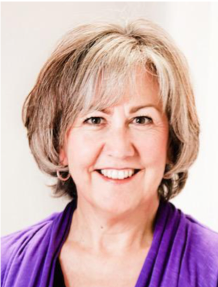
Why Women Seem to Struggle with Stress More Than Men
Stress management is a common ingredient in the journey to perfect work/life integration, but why is it something we haven’t gotten the hang of with all the stress management resources out there? Lisa Lewis, Transformational Leadership Coach and 4word mentor, shares why she thinks women seem to struggle with stress more than men and how living at the edge of our comfort zone leaves us vulnerable to the attack of stress.
In your opinion, where does stress come from?
I like to formulate my opinions based on research. I’m fascinated with neuroscience. As much as I am capable of learning from a layman’s scientific perspective how our brains function, how we learn and grow, I am here for all of it. My background is in education; I’ve studied the process of learning, the capacity for change, and the process of growth and development for over 35 years. The short answer to where stress comes from is outside and inside our bodies.
What I’ve learned regarding the origin of stress is summed up this way: when we are outside our perceived comfort zone, we are confronted with change. Impending change causes somatic responses, which our body processes as stress. Our bodies secrete hormones such as cortisol as a response to stress. Sometimes blood pressure is elevated. Feelings of anxiety may result from these body responses. What we think about what we experience can then become a mental and emotional cycle, which can be hard to change.
Stress is a force, while strain is resistance to the force. If we try to resist stress, we make things worse. Muscles tighten. Teeth clench. Learning to alleviate stress as much as possible gives our systems more margin to process stress when it comes. How we learn to process stress is vital for our entire system’s healthy functioning both short and long term.
Why do women seem to struggle with stress more than men?
Women are known to be more relationally wired than men. We have capacity for awareness of many relationships, the complexities of which men train themselves to let pass by. Women hold those complexities and work to integrate relational components in ways that often exceed our capacity. Add the flood of hormonal imbalances that cycle through women for at least 40 years, the physical effects of childbearing, the emotional effects of barrenness, and the cessation of menses, we are faced with forces outside our control more than men. Add juggling career demands with holding all the relational demands and the physical demands, and we get a cocktail of stress to a breaking point.
In your career, when have you been the most stressed? What did you do?
In 2004 I was working 60-hour weeks starting a nonprofit school while parenting a teen and preteen and dealing with the relational stress within my family of origin. The year I turned 50, I was still working demanding hours running the business, chairing the Board of Directors, and meeting with stakeholders for the fledgling school. Our eldest son was a freshman in college, our youngest was in middle school, the nonprofit was three years old, both my parents died nine months apart and I started menopause. That period of time will always epitomize stress for me.
When my Mom died, I worked through the summer getting the school year launched then took a two-month leave for grief process. During that time, I started working with a Christian counselor who helped me begin the process of developing realistic boundaries for time. She helped me take a hard look at my mindset toward stewardship of the resource of time. I had been living outside the capacity God had given me and my emotional and spiritual health was strained because of those choices. After five months of good counsel, I was feeling more on an even keel and then my Dad died. At that point I knew I did not have the resiliency to bounce back. Through prayer and seeking pastoral and other wise counsel, I chose to step away from my career to enter a season of deep healing and restoration.
Why is stress management something a lot of us don’t do well?
I think we don’t manage stress well for two reasons: lack of acknowledgement of the problem of stress, and poor modeling of how to manage stress well. My generation has not been good at taking self-care seriously. We tell ourselves the story that we don’t have time to take care of ourselves; we have too much to do. Honestly, we have been poor models for the generations of women behind us.
Some of us have believed a misunderstood theology that is built on capitalism, not the Bible. “If it’s meant to be, it’s up to me” and “God helps those that help themselves” are both statements I’ve heard repeated as the best way to move through life. Neither of those statements align with God’s perspective on work and life outlined in the Bible. Self-care is not selfish. Rhythms of renewal are woven throughout Scripture. God knows we need rest. How many times do we actually allow ourselves a true rest? We need to admit we are living a life outside the capacity we have been given and begin addressing how to get back into alignment with how we’re made.
How can we get better at managing our stress and in turn have better work/life integration?
There are both descriptive and prescriptive elements to addressing this complex question. Some descriptive elements: our culture has held up accomplishments in high esteem. If we are susceptible to the influence of others, wanting to be well thought of, to fit in, to gain wealth and prestige, then we will be prone to living a life where excessive stress is the norm. There will always be stress; family relationships, work demands, even something as predictable as birthdays bring a level of stress. Recognizing how we currently manage stressors is a good beginning.
This global pandemic is proof of what it’s like to be pushed outside our comfort zone and pushes to the forefront the need to process stress in healthy ways. If we find ourselves stuffing away stress or compensating with busy-ness, those are examples of unhealthy, unsustainable ways of dealing with stress. Other options can be developed.
Prescriptive elements to managing stress: the simple act of paying attention to what you’re feeling in your body is a great place to start: tightness in your shoulders, low back pain, and difficulty sleeping can give you clues for what might be helpful to you in processing stress. If you are at your computer during the day, set a timer to remind yourself to get up, walk to a different part of your living space, get a drink of water, stretch, and look out the window to gaze at something other than the computer screen. Creating boundaries to provide margin in how you use your time, your money, and your energy are helpful in preparing to manage eventual stress. When we’re living up to the edge of our comfort zone, we are likely to fall apart when stress is added.
Anything else you’d like to share?
One of the greatest gifts we’ve been given as Christ-followers is the personal invitation from Jesus found in Matthew 11:28-30. If there is one passage to slow down, ponder, and allow to filter into your mind, I believe it’s this one. It’s been a game changer for me. In the Message the words of Jesus read: “Are you tired? Worn out? Burned out on religion? Come to me. Get away with me and you’ll recover your life. I’ll show you how to take a real rest. Walk with me and work with me—watch how I do it. Learn the unforced rhythms of grace. I won’t lay anything heavy or ill-fitting on you. Keep company with me and you’ll learn to live freely and lightly.”

Lisa Lewis has a BA in Liberal Studies, holds a K – 12 Life credential in multiple subjects, and an MA in Organizational Leadership. Lisa has 38 years experience as an educator, curriculum developer, trainer, and public speaker. Lisa has started two businesses: one nonprofit and one for profit. She is co-founder of SLO Classical Academy; a nonprofit school launched in 2005 and located in San Luis Obispo, CA.
Lisa now works as a Transformational Leadership Coach for women, helping them connect the dots of work, life and faith to live wholeheartedly as God created them. Lisa has eight years in the coaching profession and uses those skills as she trains and speaks to groups. She has been a 4word mentor since 2014.
Lisa and her husband Colin have been married 28 years, have raised two sons, and now are Mimi and Pops to three darling grand-children. Lisa came to faith in Christ as a young adult and has had an adventurous journey as His follower ever since.